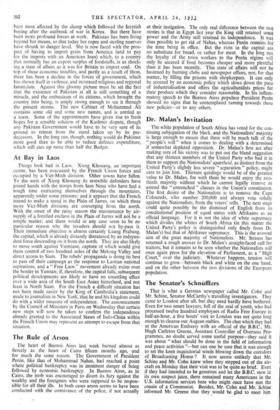The Rule of Arson
The heart of Buenos Aires last week burned almost as fiercely as the heart of Cairo fifteen months ago, and for much the same reason. The Government of President Peron, like that of Mohammad Nahas, had reached a point where political bankruptcy was in imminent danger of being followed by economic bankruptcy. In Buenos Aires, as in Cairo, the mob was encouraged to divert its fury against the wealthy and the foreigners who were supposed to be respon- sible for all their ills. In both cases arson seems to have been conducted with the connivance of the police, if not actually at their instigation. The only real difference between the twq stories is that in Egypt last year the King still retained some power and the Army still retained its independence. It was thus possible to get rid of Nahas, whereas Peron remains fop the time being in office. But the riots in the capital are no substitute for bread, or rather for meat. In the long run the loyalty of the town workers to the Perlin regime will only be secured if food becomes cheaper and more plentiful than it Jas been recently. This state of affairs will not be hastened by burning clubs and newspaper offices, nor, for that matter, by filling the prisons with shopkeepers. It can only be secured by an economic policy which slows down the pace of industrialisation and offers the agriculturalists prices for their produce which they consider reasonable. In his inflam- matory speech to the Buenos Aires populace President Peron showed no signs that he contemplated turning towards these new policies—oi• to any others.


































 Previous page
Previous page